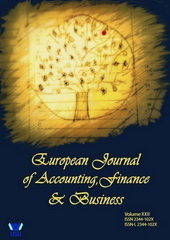|

ISSN: 2344 - 102X
ISSN-L: 2344 - 102X
Our journal is currently indexed in the following databases:
|
| |
Article from Volume 10, Number 1, Year 2022| ANALYSIS OF THE ECONOMIC PERFORMANCE AND SUSTAINABILITY OF BUSINESSES OPERATING IN ELECTRICITY PRODUCTION AND DISTRIBUTION INDUSTRY | 
Download | | Author(s): Veronica Grosu, Ioana Andrioaia, Iulian Dascalu | | DOI: 10.4316/EJAFB.2022.10113 | | Abstract: Recently, the concept of energy independence has attracted the attention of researchers during the last few years. The majority of EU member countries are dependent on imported energy, which is not a favorable aspect in the current context of the energy crisis and the Russian-Ukrainian conflict. In addition, it is also necessary to find solutions for sustainable development and to address the environmental impact of fossil fuel. Thus, to contribute to the efforts to move towards a sustainable economy the aim of the research is focused on the analysis of financial performance and economic sustainability indicators of businesses operating in the field of electricity producers as well as electricity distributors. To achieve the proposed aim, the following objectives are pursued in this paper: O1 - Analyze the operational electricity market in Romania and its participants; O2 - Review the scientific literature on the economic performance and sustainability of electricity producers and distributors; O3 - Develop econometric models that can describe the influence of financial ratios on the financial performance and economic sustainability of energy businesses. The results helped in the development of an econometric model that reveals which economic indicators have a significant influence on the performance and sustainability of businesses based on the production and distribution of electricity. | | Keywords: Economic Performance; Electricity; Energy Crisis; Sustainability | References:
1. Boiral, O., Henri, J. F., & Talbot, D. (2012). Modeling The Impacts Of Corporate Commitment On Climate Change. Business Strategy And The Environment, 21(8), 495-516.
2. Bourgeois III, L. J. (1981). On The Measurement Of Organizational Slack. Academy Of Management Review, 6(1), 29-39.
3. Broadstock, D. C., Managi, S., Matousek, R., & Tzeremes, N. G. (2019). Does Doing “good” Always Translate Into Doing “well”? An Eco?efficiency Perspective. Business Strategy And The Environment, 28(6), 1199-1217.
4. Connors, S., Anderson-MacDonald, S., & Thomson, M. (2017). Overcoming The ‘window Dressing’effect: Mitigating The Negative Effects Of Inherent Skepticism Towards Corporate Social Responsibility. Journal Of Business Ethics, 145(3), 599-621.
5. Daniel, F., Lohrke, F. T., Fornaciari, C. J., & Turner Jr, R. A. (2004). Slack Resources And Firm Performance: A Meta-analysis. Journal Of Business Research, 57(6), 565-574.
6. Endrikat, J., Guenther, E., & Hoppe, H. (2014). Making Sense Of Conflicting Empirical Findings: A Meta-analytic Review Of The Relationship Between Corporate Environmental And Financial Performance. European Management Journal, 32(5), 735-751.
7. Fatemi, A., Glaum, M., ?i Kaiser, S. (2018). ESG Performance And Firm Value: The Moderating Role Of Disclosure. Global Finance Journal, 38, 45-64.
8. Freeman, R.E. (2010). Strategic Management: A Stakeholder Approach; Pitman: Boston, MA, USA.
9. Friede, G., Busch, T., & Bassen, A. (2015). ESG And Financial Performance: Aggregated Evidence From More Than 2000 Empirical Studies. Journal Of Sustainable Finance & Investment, 5(4), 210-233.
10. Hart, S. L. (1995). A Natural-resource-based View Of The Firm. Academy Of Management Review, 20(4), 986-1014.
11. Hart, S. L., & Dowell, G. (2011). Invited Editorial: A Natural-resource-based View Of The Firm: Fifteen Years After. Journal Of Management, 37(5), 1464-1479.
12. Kock, C. J., Santalo, J., & Diestre, L. (2012). Corporate Governance And The Environment: What Type Of Governance Creates Greener Companies?. Journal Of Management Studies, 49(3), 492-514.
13. Mezher, T., Tabbara, S., ?i Al?Hosany, N. (2010). An Overview Of CSR In The Renewable Energy Sector: Examples From The Masdar Initiative In Abu Dhabi. Management Of Environmental Quality: An International Journal.
14. Mih?il?, M.N. (2017). Impact Of Costs On The Decision-making Process In The Electricity Supply Sector, University Of Craiova.
15. Nollet, J., Filis, G., & Mitrokostas, E. (2016). Corporate Social Responsibility And Financial Performance: A Non-linear And Disaggregated Approach. Economic Modelling, 52, 400-407.
16. Perramon, J., Alonso-Almeida, M. D. M., Llach, J., ?i Bagur-Femenías, L. (2014). Green Practices In Restaurants: Impact On Firm Performance. Operations Management Research, 7(1), 2-12.
17. Sathaye, J., Lecocq, F., Masanet, E., Najam, A., Schaeffer, R., Swart, R., & Winkler, H. (2009). Opportunities To Change Development Pathways Toward Lower Greenhouse Gas Emissions Through Energy Efficiency. Energy Efficiency, 2(4), 317-337.
18. Surroca, J., Tribó, J. A., & Waddock, S. (2010). Corporate Responsibility And Financial Performance: The Role Of Intangible Resources. Strategic Management Journal, 31(5), 463-490.
19. Tzouvanas, P., Kizys, R., Chatziantoniou, I., & Sagitova, R. (2020). Environmental Disclosure And Idiosyncratic Risk In The European Manufacturing Sector. Energy Economics, 87, 104715.
20. Weber, O. (2014). The Financial Sector's Impact On Sustainable Development. Journal Of Sustainable Finance & Investment, 4(1), 1-8.
|
| | Back to journal ... |
|
|
| |
|
|
|

